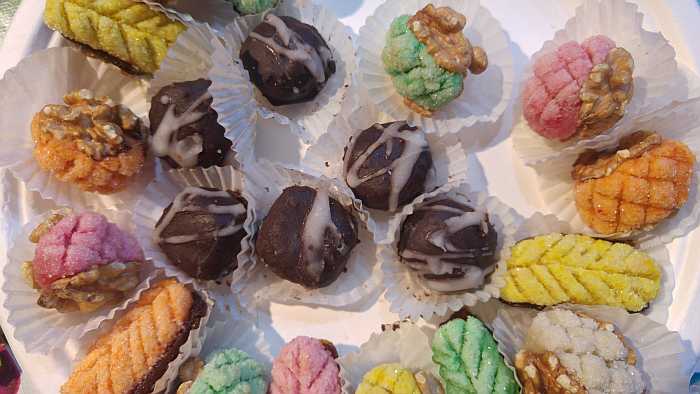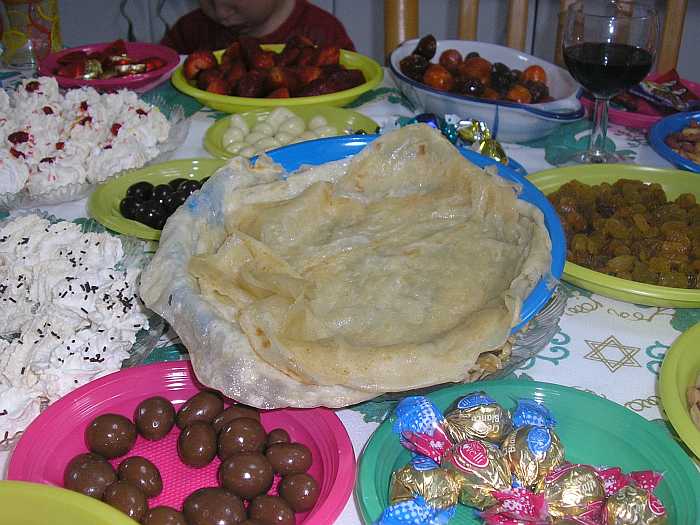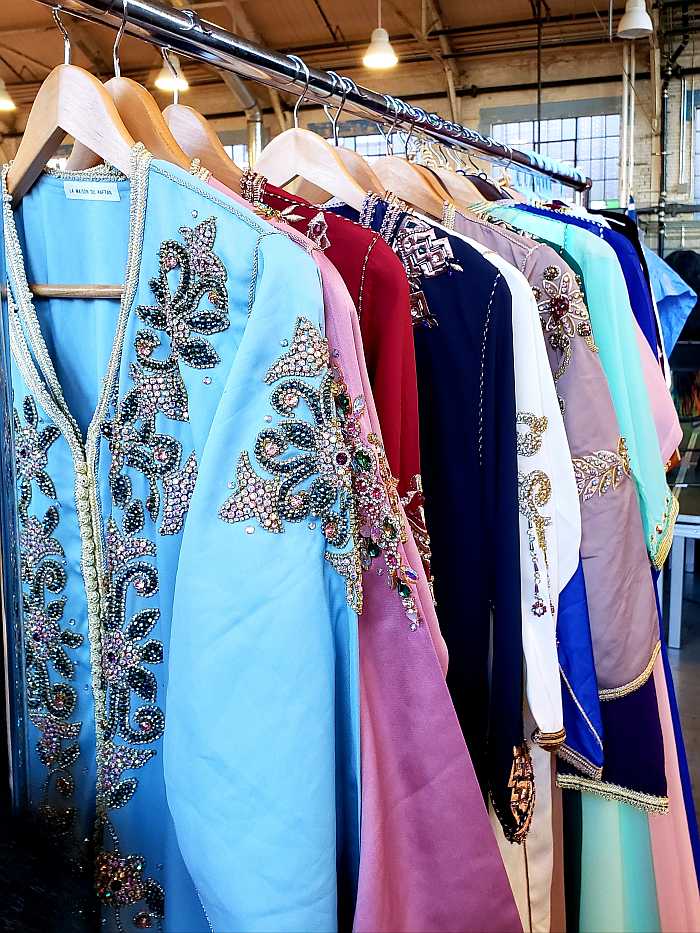
Photo: Laliv Pikiwiki Israel, CC BY 2.5, via Wikimedia Commons
Mimouna may not be as widely known as Passover, yet it holds a charm and joy that is equally captivating. This remarkable celebration, traditionally observed by Moroccan Jews, marks an important cultural and culinary transition: the shift from the dietary restrictions of Passover to a time of joyous gatherings, and the reintroduction of chametz (leavened foods) into the diet.
Mimouna, with its unique blend of cultural traditions and festive celebrations, is increasingly becoming a highlight in diverse Passover programs around the world. This inclusion not only enriches the Passover experience but also offers a unique opportunity for participants to delve into this Sephardic customs and communal joy, broadening their understanding and appreciation of Jewish heritage.
Understanding Passover: The Foundation to Mimouna
To fully appreciate the significance of Mimouna, it's essential to understand Passover, the holiday that precedes it. Passover, or Pesach in Hebrew, commemorates the Israelites' exodus from Egypt and their liberation from slavery. This eight-day festival (seven days in Israel) is deeply spiritual and reflective, observed by abstaining from chametz.
During Passover, meals are carefully prepared to comply with these restrictions. Foods like matzah (unleavened bread) take center stage, along with other kosher-for-Passover items that exclude leavening agents. The dietary limitations, while reflective of deep historical and spiritual themes, also create a palpable sense of anticipation for the return to regular foods. For Ashkenazim, this means a trip to the local supermarket but for Sephardim, this means Mimouna.
A Celebration of Unity and Sweetness
Originating in the Jewish communities of North Africa, most notably Morocco, Mimouna is a vibrant festival that embodies the spirit of community, generosity, and optimism. As families conclude the week-long observance of Passover with its stringent dietary restrictions, Mimouna emerges as a refreshing counterpoint, offering a moment to rejoice, reconnect, and indulge in the sweetness of life.
The name 'Mimouna' itself is shrouded in mystery and charm. There are some who believe that it was named for the Rambam (Maimonides) and that the date marks his birth or death. Some believe it derives from the Hebrew word "emunah" (faith), signifying a renewed faith in life's abundance as spring unfolds. Others attribute it to the Arabic word for wealth and luck, reflecting the community's aspirations for prosperity and happiness in the coming year.


Mufletta (Photo: Almog, Public domain, via Wikimedia Commons)
The Heart of Mimouna: Traditions and Delicacies
The central theme of Mimouna revolves around sweetness and prosperity. In the spirit of inclusiveness and friendship, homes are adorned with symbols of luck and prosperity, and families prepare a lavish spread of sweet delicacies. Families open their homes to neighbors, friends, and even strangers, setting tables with an array of sweet treats and symbolic foods. A common sight is the mufletta, a sweet, crepe-like pancake, often served with honey or jam.
Most of us are busy putting away our Passover dishes so you might be wondering how the Sephardim manage to prepare this spread and open their homes. Most of the sweet foods served at the Mimouna are actually made with nuts, sesame seeds, fruits and jams that are kosher for Passover and made on Pesach. Usually, the only thing made with wheat flour is the mufletta that is made fresh as soon as the holiday ends.
One of the unique aspects of Mimouna is the blend of Jewish and North African customs. This fusion is evident in the music, decorations, and even the clothing that participants wear during the celebrations. Traditional Moroccan attire is often donned, adding vibrant colors and cultural depth to the festivities.
In many communities, the end of Passover and the celebration of Mimouna is a seamless transition. As people move from the dietary restrictions of Passover back to regular eating, Mimouna provides a sweet and communal way to make this shift.


(Photo: Envato)
Mimouna's Worldwide Celebration: A Mosaic of Cultures and Traditions
While deeply rooted in Moroccan Jewish culture, Mimouna has transcended its origins, becoming a celebration embraced by diverse Jewish communities around the globe. Each community adds its own local flavor to the festivities, reflecting the universal themes of hope, renewal, and hospitality that define Mimouna.
In Israel, where a significant Moroccan Jewish population resides, Mimouna has evolved into a national celebration. It's a public event marked by large gatherings, street parties, and even political participation. Here, the traditional aspects blend with Israeli culture, making it a unique fusion that highlights Israel's multicultural landscape.
In France, home to one of the largest Sephardic communities in Europe, Mimouna is a more intimate affair. Celebrations often focus on family gatherings and communal meals, where traditional Moroccan dishes are served alongside French delicacies, symbolizing the harmonious blend of Sephardic and French Jewish traditions.
Across the Atlantic, in North America, Mimouna is gaining popularity, particularly among younger generations curious about Sephardic customs. In cities like New York and Montreal, where diverse Jewish communities thrive, Mimouna often takes on a multicultural dimension. These celebrations are opportunities for cross-community engagement, where Ashkenazi, Sephardic, and Mizrahi Jews come together, sharing their distinct traditions and fostering a greater sense of Jewish unity.
The Growing Popularity in Passover Programs
In recent years, Mimouna has found a special place in Passover programs worldwide. These programs, designed to provide immersive Passover experiences, now often include Mimouna celebrations as their grand finale. It's an opportunity for people of different backgrounds to experience this unique tradition, fostering a deeper understanding and appreciation of Sephardic customs and heritage.
Conclusion
Mimouna is a beautiful testament to the enduring spirit of community, hope, and joy within the Jewish tradition. As it grows in popularity and becomes a staple in Passover programs globally, more people have the opportunity to partake in its sweet, unifying celebration. As we bid farewell to Passover each year, Mimouna stands as a vibrant bridge to the days ahead, filled with sweetness, prosperity, and communal harmony.